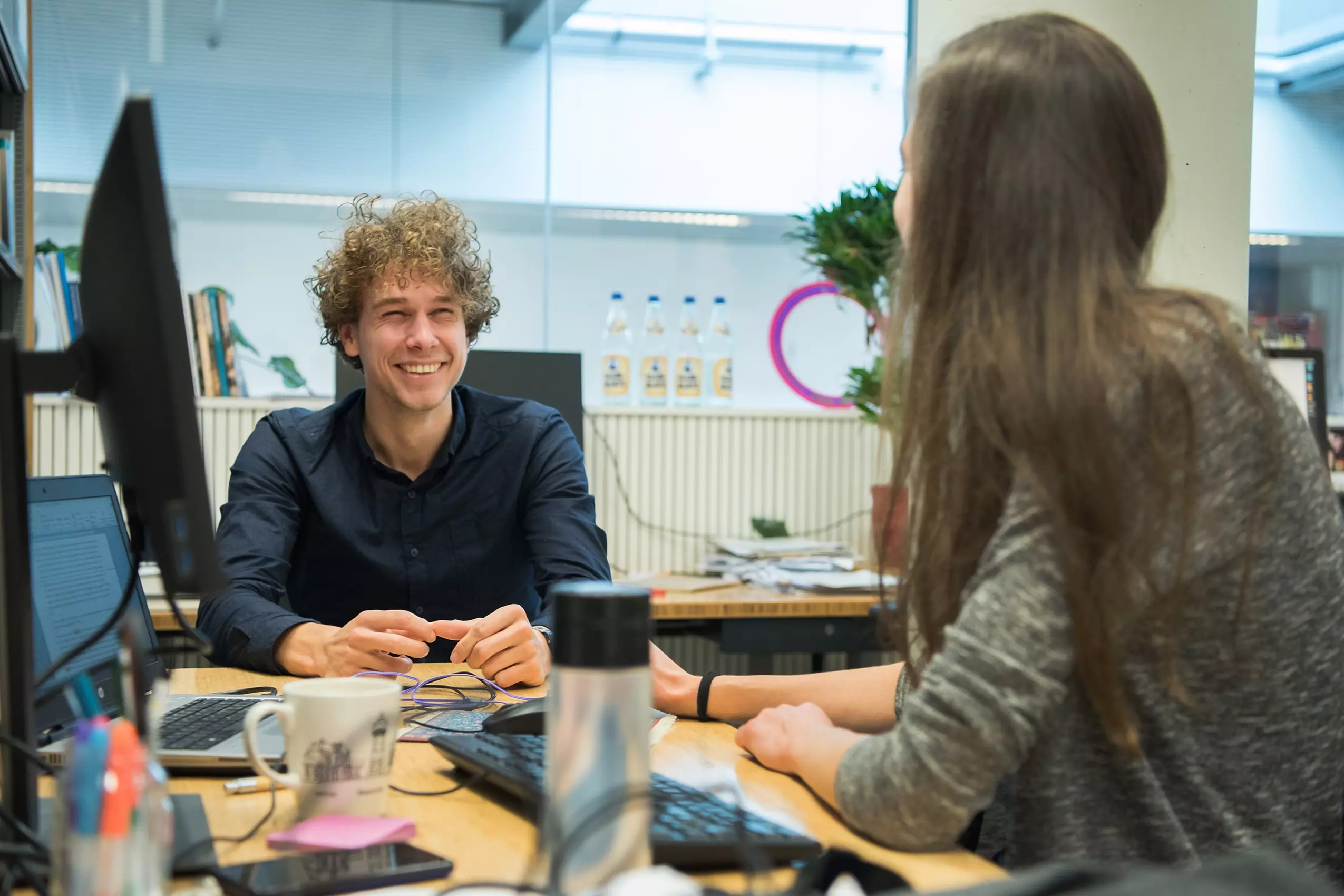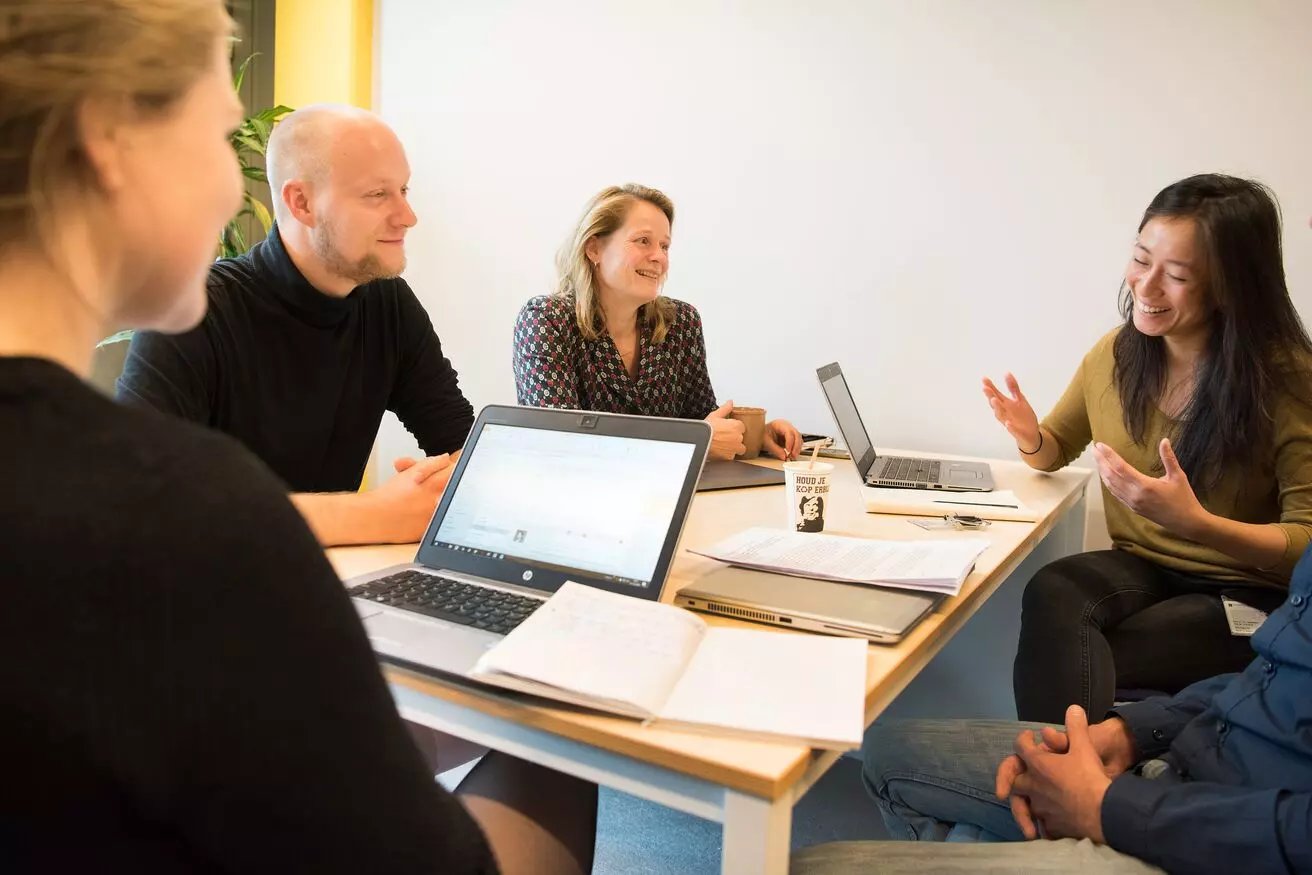This website uses cookies
We, and third parties, use cookies on our website. We use cookies to ensure that our website functions properly, to store your preferences, to gain insight into visitor behavior, but also for marketing and social media purposes (showing personalized advertisements). By clicking 'Accept', you agree to the use of all cookies. In our Cookie Statement. you can read more about the cookies we use and save or change your preferences. By clicking 'Refuse' you only agree to the use of functional cookies.

PhD position in Infant Gut Microbiota and Bioactive Metabolites
- Faculty of Science
- 14379
- Master's
- €3.059 - €3.881
- 38 hours
- Closes on19-09-2025
.jpg)
PhD position in Infant Gut Microbiota and Bioactive Metabolites
- Faculty of Science
- 14379
- Master's
- €3.059 - €3.881
- 38 hours
- Closes on19-09-2025
Working at the UvA
Join us!
Over 100 million infants are born worldwide every year. Immediately after birth, microbes start to colonize our “germ-free” gut to form a complex microbial community called gut microbiota. Gut microbiota develops rapidly during early life and is essential for our health during infancy and later life. Microbes, individually or work in concert, can substantially impact the development of the immune system, hence the infant susceptibility to chronic diseases or infection. However, it remains elusive which bacteria and their metabolites are beneficially training our naïve immune system. Understanding this complex interaction could pave the way to discovering new targets or interventions to strengthening infant health.
This PhD project aims to investigate specific early bacterial colonizers, their bioactive metabolites, and their beneficial interactions with our naïve immune system at the early stage of our life. Using multi-disciplinary approaches such as anaerobic culturing, synthetic biology, organoids and infant GuMI models, metabolomics and proteomics, the goal is to identify beneficial bacterial metabolites and genes that are responsible for immune training. The project is part of NeoGutChip project, a EU funded ERC Starting Grant.

Working at the UvA
Join us!
Over 100 million infants are born worldwide every year. Immediately after birth, microbes start to colonize our “germ-free” gut to form a complex microbial community called gut microbiota. Gut microbiota develops rapidly during early life and is essential for our health during infancy and later life. Microbes, individually or work in concert, can substantially impact the development of the immune system, hence the infant susceptibility to chronic diseases or infection. However, it remains elusive which bacteria and their metabolites are beneficially training our naïve immune system. Understanding this complex interaction could pave the way to discovering new targets or interventions to strengthening infant health.
This PhD project aims to investigate specific early bacterial colonizers, their bioactive metabolites, and their beneficial interactions with our naïve immune system at the early stage of our life. Using multi-disciplinary approaches such as anaerobic culturing, synthetic biology, organoids and infant GuMI models, metabolomics and proteomics, the goal is to identify beneficial bacterial metabolites and genes that are responsible for immune training. The project is part of NeoGutChip project, a EU funded ERC Starting Grant.
All about this vacancy
What are you going to do?
Your work will focus on identifying the genes and bioactive metabolites produced by infant gut microbes, and validate their function using in vitro cell cultures and advanced infant GuMI gut microphysiological systems. The position is embedded within The MBMFS Group in the GuMI lab of dr. Jianbo Zhang at the Swammerdam Institute for Life Sciences, University of Amsterdam (UvA).
Tasks and responsibilities:
- complete and defend a PhD thesis within the official appointment duration of four years;
- gain knowledge of the field through literature survey, discussion with team members, and internal lab meetings;
- contribute to the design of experiments, perform experiments in the lab and analyze and interpret results of the experiments;
- perform preclinical in vitro experiments;
- take a leading role in writing manuscripts;
- be an active member of the research teams and present your results at (inter)national scientific meetings;
- participate in the Faculty of Science PhD training programme;
- assist in teaching Bachelor and Master’s students;
- co-supervise junior scientists (technicians, MSc/BSc students).
What do you have to offer?
You are excited about science and have a particular interest in and preferably have knowledge of gut anaerobic culturing, bioinformatics, and mass spectrometry data analysis. You like a challenge and you have a problem-solving mindset. You have good statistical skills and experience with analyzing metabolomic and metagenomic sequencing data. You like to work in diverse settings as you have to communicate closely with a diverse team (i.e. microbiologists, data analyst, cell biologists, immunologist, engineers). You are a team player and a nice colleague who enjoys being part of an interdisciplinary team of scientists. Finally, you have good time management skills enabling you to meet the projects’ deadlines for finishing analyses, reports and other deliverables.
Your experience and profile
You have/are
- a MSc degree in Biomedical Sciences, Microbiology, or related fields;
- experience with anaerobic bacterial culturing, mass spectrometry data analysis;
- experience with omics analyses and coding (e.g. python, R);
- experience with bacterial genetic engineering or mammalian cell culture is a plus;
- good project and time management skills enabling you to meet the projects’ deadlines for finishing analyses, reports and other deliverables;
- good analytical, writing and presenting skills;
- fluent in English, both written and spoken and the willingness to learn Dutch (in case not Dutch native speaker).
Our offer
A temporary contract for 38 hours per week for the duration of 4 years (the initial contract will be for a period of 18 months and after satisfactory evaluation it will be extended for a total duration of 4 years). The preferred starting date is 1 November 2025 This should lead to a dissertation (PhD thesis). We will draft an educational plan that includes attendance of courses and (international) meetings. We also expect you to assist in teaching undergraduates and master students.
Based on a full-time appointment (38 hours per week) the gross monthly salary will range from €3,059 in the first year to €3,881 (scale P) in the last year. This does not include 8% holiday allowance and 8,3% year-end allowance. The UFO profile PhD candidate applicable. The Collective Labour Agreement of Universities of the Netherlands is applicable.
Besides the salary and a vibrant and challenging environment at Science Park we offer you multiple fringe benefits:
- 232 holiday hours per year (based on fulltime);
- multiple courses to follow from our Teaching and Learning Centre;
- a complete educational program for PhD students;
- a pension at ABP for which UvA pays two third part of the contribution;
- the possibility to follow courses to learn Dutch;
- help with housing for a studio or small apartment when you’re moving from abroad.
Are you curious to read more about our extensive package of secondary employment benefits, take a look here.
All about this vacancy
What are you going to do?
Your work will focus on identifying the genes and bioactive metabolites produced by infant gut microbes, and validate their function using in vitro cell cultures and advanced infant GuMI gut microphysiological systems. The position is embedded within The MBMFS Group in the GuMI lab of dr. Jianbo Zhang at the Swammerdam Institute for Life Sciences, University of Amsterdam (UvA).
Tasks and responsibilities:
- complete and defend a PhD thesis within the official appointment duration of four years;
- gain knowledge of the field through literature survey, discussion with team members, and internal lab meetings;
- contribute to the design of experiments, perform experiments in the lab and analyze and interpret results of the experiments;
- perform preclinical in vitro experiments;
- take a leading role in writing manuscripts;
- be an active member of the research teams and present your results at (inter)national scientific meetings;
- participate in the Faculty of Science PhD training programme;
- assist in teaching Bachelor and Master’s students;
- co-supervise junior scientists (technicians, MSc/BSc students).
What do you have to offer?
You are excited about science and have a particular interest in and preferably have knowledge of gut anaerobic culturing, bioinformatics, and mass spectrometry data analysis. You like a challenge and you have a problem-solving mindset. You have good statistical skills and experience with analyzing metabolomic and metagenomic sequencing data. You like to work in diverse settings as you have to communicate closely with a diverse team (i.e. microbiologists, data analyst, cell biologists, immunologist, engineers). You are a team player and a nice colleague who enjoys being part of an interdisciplinary team of scientists. Finally, you have good time management skills enabling you to meet the projects’ deadlines for finishing analyses, reports and other deliverables.
Your experience and profile
You have/are
- a MSc degree in Biomedical Sciences, Microbiology, or related fields;
- experience with anaerobic bacterial culturing, mass spectrometry data analysis;
- experience with omics analyses and coding (e.g. python, R);
- experience with bacterial genetic engineering or mammalian cell culture is a plus;
- good project and time management skills enabling you to meet the projects’ deadlines for finishing analyses, reports and other deliverables;
- good analytical, writing and presenting skills;
- fluent in English, both written and spoken and the willingness to learn Dutch (in case not Dutch native speaker).
Our offer
A temporary contract for 38 hours per week for the duration of 4 years (the initial contract will be for a period of 18 months and after satisfactory evaluation it will be extended for a total duration of 4 years). The preferred starting date is 1 November 2025 This should lead to a dissertation (PhD thesis). We will draft an educational plan that includes attendance of courses and (international) meetings. We also expect you to assist in teaching undergraduates and master students.
Based on a full-time appointment (38 hours per week) the gross monthly salary will range from €3,059 in the first year to €3,881 (scale P) in the last year. This does not include 8% holiday allowance and 8,3% year-end allowance. The UFO profile PhD candidate applicable. The Collective Labour Agreement of Universities of the Netherlands is applicable.
Besides the salary and a vibrant and challenging environment at Science Park we offer you multiple fringe benefits:
- 232 holiday hours per year (based on fulltime);
- multiple courses to follow from our Teaching and Learning Centre;
- a complete educational program for PhD students;
- a pension at ABP for which UvA pays two third part of the contribution;
- the possibility to follow courses to learn Dutch;
- help with housing for a studio or small apartment when you’re moving from abroad.
Are you curious to read more about our extensive package of secondary employment benefits, take a look here.
Your place at the UvA
About us
The Swammerdam Institute for Life Sciences is located at the vibrant Amsterdam Science Park. SILS is one of eight institutes of the University of Amsterdam's Faculty of Science (FNWI). With around 240 employees, the Swammerdam Institute carries out internationally high-quality life science research and provides education within various university programs. Research is also carried out in close cooperation with the medical, biotech, chemical, flavor, food & agricultural, and high-tech industries, and revolves around 4 main themes, Cell & Systems biology, Neurosciences, Microbiology and Green Life Sciences.
More about the UvA
Your place at the UvA
This is where you will be working
About us
The Swammerdam Institute for Life Sciences is located at the vibrant Amsterdam Science Park. SILS is one of eight institutes of the University of Amsterdam's Faculty of Science (FNWI). With around 240 employees, the Swammerdam Institute carries out internationally high-quality life science research and provides education within various university programs. Research is also carried out in close cooperation with the medical, biotech, chemical, flavor, food & agricultural, and high-tech industries, and revolves around 4 main themes, Cell & Systems biology, Neurosciences, Microbiology and Green Life Sciences.
More about the UvA
Important to know
Your application & contact
Do you have any questions or do you require additional information? Please contact:
- Dr. Jianbo Zhang, [email protected]
If you feel the profile fits you, and you are interested in the job, we look forward to receiving your application. We accept applications until and including 19 September 2024.
Applications should include the following information (all files besides your cv should be submitted in one single pdf file):
- a detailed CV including the months (not just years) when referring to your education and work experience;
- a letter of motivation;
- the names and email addresses of two references who can provide letters of recommendation.
A knowledge security check can be part of the selection procedure.
(for details: national knowledge security guidelines)
Only complete applications received within the response period via the link below will be considered.
The interviews will be held continuously until the position is filled.
Diversity, Equity & Inclusion
Important to know
Your application & contact
Do you have any questions or do you require additional information? Please contact:
- Dr. Jianbo Zhang, [email protected]
If you feel the profile fits you, and you are interested in the job, we look forward to receiving your application. We accept applications until and including 19 September 2024.
Applications should include the following information (all files besides your cv should be submitted in one single pdf file):
- a detailed CV including the months (not just years) when referring to your education and work experience;
- a letter of motivation;
- the names and email addresses of two references who can provide letters of recommendation.
A knowledge security check can be part of the selection procedure.
(for details: national knowledge security guidelines)
Only complete applications received within the response period via the link below will be considered.
The interviews will be held continuously until the position is filled.
Other interesting vacancies for you

PhD position on language and academic achievement
- Faculty of Humanities
- €3.059 - €3.881
- Closes on03-10-2025
- Master's
- 38 hours

PhD position on Academic Literacy Development in Dutch and English Academic Programmes
- Faculty of Humanities
- €3.059 - €3.881
- Closes on03-10-2025
- Master's
- 38 hours
.jpg)
PhD Models of Phytoplankton-Virus Interactions
- Faculty of Science
- €3.059 - €3.881
- Closes on30-09-2025
- Master's
- 38 hours
Other interesting vacancies for you

PhD position on language and academic achievement
- Faculty of Humanities
- €3.059 - €3.881
- Closes on03-10-2025
- Master's
- 38 hours
.jpg)
PhD position on Academic Literacy Development in Dutch and English Academic Programmes
- Faculty of Humanities
- €3.059 - €3.881
- Closes on03-10-2025
- Master's
- 38 hours

PhD Models of Phytoplankton-Virus Interactions
- Faculty of Science
- €3.059 - €3.881
- Closes on30-09-2025
- Master's
- 38 hours

Don't miss out on your dream job!

